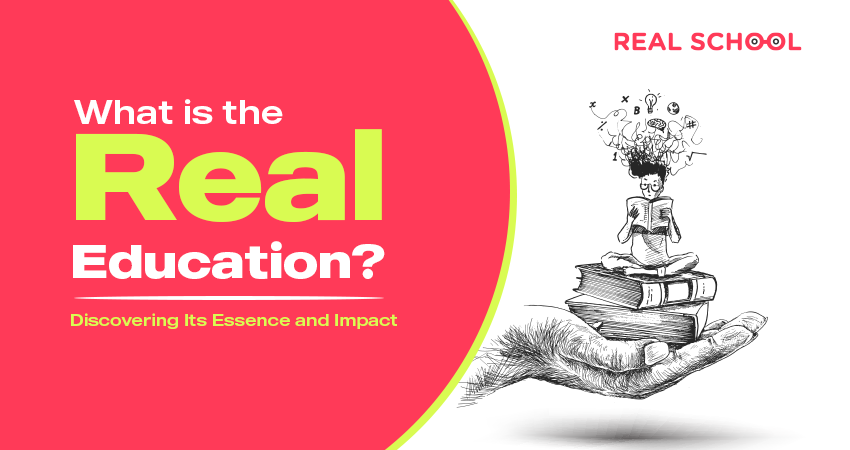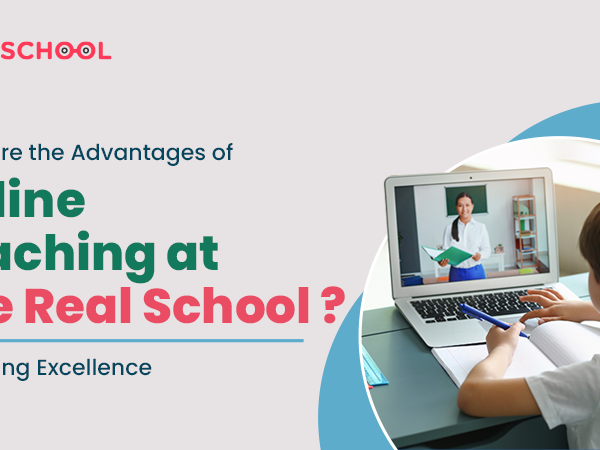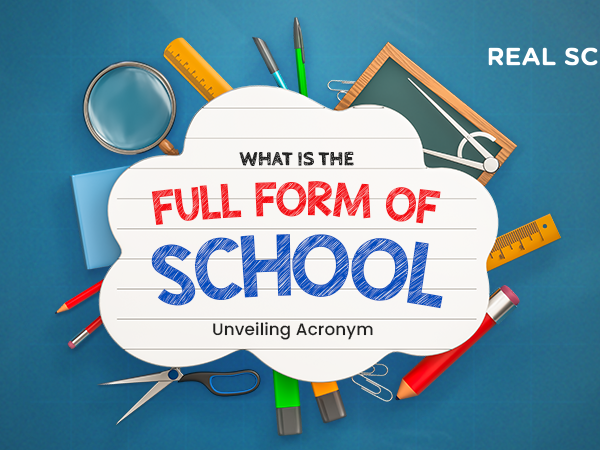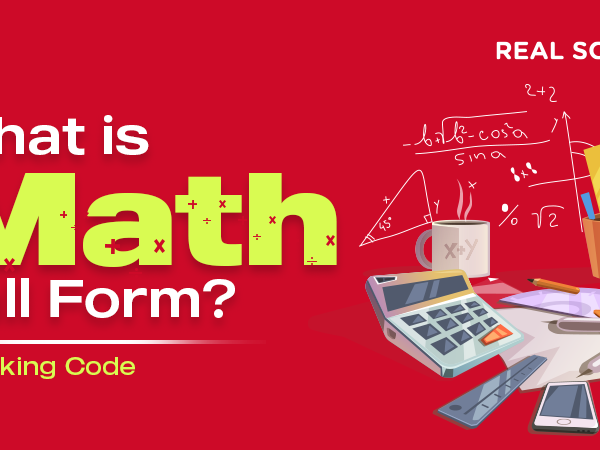The concept of real education is evolving, transcending traditional views that equate it solely with academic achievements. It extends beyond grades, encompassing holistic learning, character building, practical application, and lifelong skills. In this exploration- “What is Real Education?”, we delve into the its essence and profound impact on individuals and society.
Discover: What is Real Education!!
Beyond Grades: Holistic Learning
- Academic achievements vs. holistic development: Real education recognizes that academic achievements are just one facet of a comprehensive learning experience. It emphasizes holistic development, nurturing various aspects of a student’s personality, including critical thinking, creativity, and a love for learning.
- The role of critical thinking and problem-solving skills: Real education places a strong emphasis on cultivating critical thinking and problem-solving skills. These skills empower individuals to analyze situations, make informed decisions, and navigate complex challenges in both academic and real-world contexts.
- Nurturing creativity, curiosity, and a love for learning: Holistic learning involves nurturing creativity, curiosity, and a genuine love for learning. Real education encourages students to explore diverse fields, think outside the box, and foster a lifelong passion for acquiring knowledge beyond the constraints of formal education.
Character Building: Values and Ethics
- The importance of instilling values in education: Real education goes beyond imparting knowledge; it instills values and ethics in students. This includes integrity, empathy, and a sense of social responsibility. These values lay the foundation for ethical decision-making and contribute to the overall character development of individuals.
- Developing ethical decision-making skills: Real education emphasizes the development of ethical decision-making skills. Students are encouraged to evaluate situations from a moral standpoint, considering the impact of their choices on themselves and others. This ethical framework guides them in both personal and professional spheres.
- Fostering a sense of social responsibility and empathy: It promotes a sense of social responsibility and empathy. Students are encouraged to understand and address societal issues, fostering a commitment to making positive contributions to their communities. This sense of empathy builds a more compassionate and connected society.
Practical Application: Bridging Theory and Reality
- The need for practical, real-world application of knowledge: Real education emphasizes the practical application of knowledge, bridging the gap between theory and reality. This involves hands-on experiences, internships, and projects that allow students to apply what they’ve learned in meaningful and practical ways.
- Incorporating experiential learning opportunities: Experiential learning is a key component of real education. It provides students with opportunities to engage in real-world scenarios, applying theoretical concepts to actual situations. This hands-on approach enhances their understanding and prepares them for the challenges of the professional world.
- Preparing students for the challenges of the professional world: It equips students with the skills and knowledge needed to navigate the professional world successfully. It goes beyond theoretical understanding to prepare individuals for the dynamic and evolving demands of their chosen fields.
Lifelong Learning: Adapting to Change
- Embracing a mindset of continuous learning: Real education fosters a mindset of continuous learning. It encourages individuals to embrace learning as a lifelong journey, recognizing that the ability to adapt to new information and evolving circumstances is crucial in a rapidly changing world.
- The role of adaptability and resilience in real education: Adaptability and resilience are integral components of it. Individuals are taught to navigate challenges, learn from setbacks, and develop the resilience needed to persevere in the face of adversity. These qualities contribute to personal growth and long-term success.
- Cultivating a passion for learning beyond formal education: It instills a passion for learning that extends beyond formal education. Individuals are encouraged to explore diverse interests, pursue personal projects, and engage in continuous self-improvement, contributing to a fulfilling and intellectually rich life.
Also Read: How Do You Start Homeschooling For Your Child?
Essence and Impact: What is Real Education!!
Inclusive Education: Embracing Diversity
- Recognizing and celebrating diversity in education: Real education embraces diversity in all its forms. It recognizes the unique strengths and perspectives that individuals from diverse backgrounds bring to the learning environment. Inclusive education ensures that everyone has equal access to educational opportunities.
- Creating an inclusive and equitable learning environment: Inclusive education goes beyond tolerance; it creates an environment where every individual feels valued and included. This inclusivity fosters a sense of belonging, encourages collaboration, and contributes to the development of a harmonious and diverse society.
- The impact of inclusive education on societal harmony: Real education understands that an inclusive education system contributes to societal harmony. By promoting understanding, empathy, and respect for differences, it lays the groundwork for a society that celebrates diversity and works together towards common goals.
Critical Thinking: Questioning and Analyzing
- Encouraging students to question and analyze information: Real education places a strong emphasis on encouraging students to question and analyze information critically. This approach cultivates independent thinking, curiosity, and a deeper understanding of the subjects they study.
- Developing critical thinking skills for informed decision-making: Critical thinking skills are crucial in real education. Students learn to evaluate information objectively, consider multiple perspectives, and make informed decisions. These skills are transferable to various aspects of life, contributing to intellectual growth and problem-solving abilities.
- The role of open-mindedness in fostering intellectual growth: Open-mindedness is a cornerstone of real education. Students are encouraged to approach new ideas and perspectives with an open mind, fostering intellectual growth and a broader understanding of the world. This openness to diverse viewpoints enhances their ability to engage with complex issues.
Personal Growth: Self-Discovery and Confidence
- Real education as a journey of self-discovery: Real education is viewed as a journey of self-discovery. It encourages individuals to explore their interests, passions, and strengths, leading to a deeper understanding of themselves. This self-discovery is a transformative process that contributes to personal growth.
- Building confidence and a positive self-image: Real education plays a pivotal role in building confidence and fostering a positive self-image. As individuals discover their capabilities and achievements, they develop a sense of self-worth and confidence that extends beyond academic accomplishments.
- The long-term impact on personal and professional success: The personal growth fostered by real education has a lasting impact on both personal and professional success. Individuals equipped with self-awareness, confidence, and a love for learning are better prepared to navigate life’s challenges and pursue fulfilling careers.
Social Skills: Collaboration and Communication
- The significance of interpersonal skills in real education: It recognizes the importance of interpersonal skills. Collaboration, teamwork, and effective communication are emphasized as essential components of success in both personal and professional spheres.
- Enhancing collaboration and effective communication: Students are actively encouraged to develop their collaboration and communication skills. These skills are essential for working effectively in team settings, fostering positive relationships, and contributing to a collaborative and inclusive society.
- Preparing students for meaningful social interactions: Real education prepares students for meaningful social interactions beyond the classroom. Whether in the workplace or the community, individuals with strong social skills can navigate diverse social environments, build connections, and contribute positively to society.
Also Read: What is a Montessori Preschool Program?
Conclusion
In conclusion – “What is Real Education?”, it is a multifaceted concept that transcends traditional notions of academic achievements. It encompasses holistic learning, character building, practical application, and the development of lifelong skills. Its transformative impact extends beyond individuals to shape a society that values diversity, critical thinking, and ethical decision-making.
Know more from the expert for your child education – The Real School
FAQs
Q1: How does real education differ from traditional views of academic achievement?
A: It goes beyond traditional views by emphasizing holistic learning, character building, practical application, and lifelong skills. It recognizes that academic achievements are just one aspect of a comprehensive learning experience.
Q2: Why is character building considered an integral part of real education?
A: Character building is integral to it because it instills values, ethics, and social responsibility in individuals. It contributes to the overall development of a person’s character, guiding ethical decision-making and fostering a sense of empathy and social responsibility.
Q3: How does real education prepare students for the challenges of the professional world?
A: It prepares students for the professional world by emphasizing practical application, critical thinking, and adaptability. Hands-on experiences, experiential learning, and the development of lifelong skills equip individuals to navigate the challenges of their chosen fields.
Q4: What is the role of inclusivity in real education?
A: Inclusivity in it ensures that everyone, regardless of background or identity, has equal access to educational opportunities. It fosters diversity, creates a positive learning environment, and contributes to societal harmony.
Q5: How does real education contribute to personal growth and long-term success?
A: It contributes to personal growth by fostering self-discovery, confidence, and a positive self-image. These qualities have a lasting impact on personal and professional success, empowering individuals to navigate life’s challenges with resilience and adaptability.
Also Read: What is the New Education Policy 2023-24? Key Transformations







